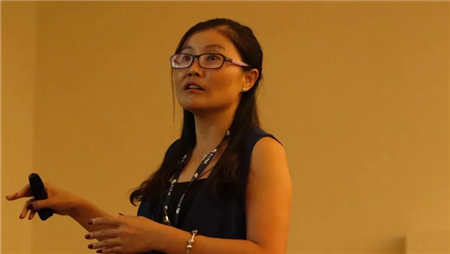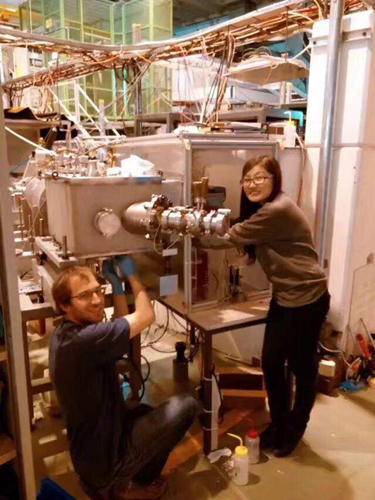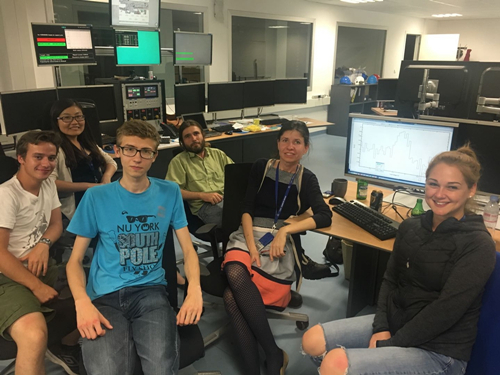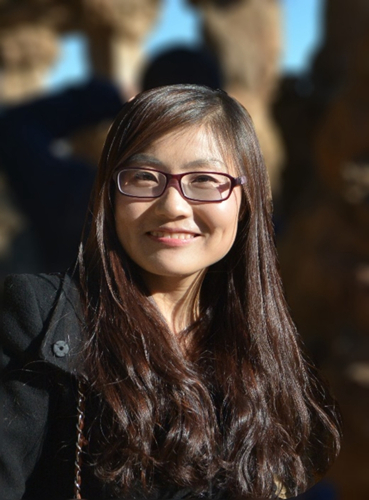Peking University, July 18, 2019: Yang Xiaofei, assistant professor of the School of Physics at Peking University, received the award of IUPAP Young Scientist Prize in Nuclear Physics in 2019.
Established in 1922, the International Union of Pure and Applied Physics (IUPAP) is an international non-governmental organization. Its mission is to assist in the global development of physics. It is noteworthy that Yang is the first recipient of this award amongst nuclear physicists who work in China. According to IUPAP, the award is recognized “for her realization of a unique laser spectroscopy technique to be applied at the PF-type radioactive isotope beam facility and for the substantial contribution to the development and operation of the laser spectroscopy devices at ISOLDE (The Isotope mass Separator On-Line facility) which measure the basic properties of exotic atomic nuclei with high resolution and efficiency.”
 Yang giving a lecture
Yang giving a lecture
Research experiences as a young scientist
Yang graduated from Lanzhou University in 2009, and obtained her doctoral degree in Nuclear Physics from Peking University in 2014. From 2011 to 2014, she studied as an International Program Association joint student in Riken Nishina Center, Japan, where she played a key role in developing a novel laser spectroscopy technique OROCHI and in the associated first physics experiment. She then joined the nuclear moment group at IKS, KU Leuven, Belgium, as a postdoctoral fellow. Her work there was mainly devoted to the laser spectroscopy experiments COLLAPS (COLlinear LAser SPectroscopy beam line) and CRIS (Collinear Resonance Ionization Spectroscopy) to study the structure of exotic isotopes. She had been a local member of CERN-ISOLDE from 2016 till 2017, supported by Junior Mobility Program of KU Leuven and FWO Grant for a long stay in Belgium, Europe. Since October 2017, she has been a faculty member at Peking University. Her main research interests are the development of high-precision and high sensitivity laser spectroscopy techniques and the associated structure studies of exotic nuclei.
Speaking of nuclear physics, what may occur to most people might be nuclear weapons like atomic bombs and hydrogen bombs, but Yang revealed that the knowledge applied in these technologies can date back to more than 50 years ago. What she is currently dedicated to is actually a field that is “both at the cutting-edge and of great diversity.”
Since accelerators, a device that accelerates charged subatomic particles or nuclei to high energies for the purpose of colliding them with other particles or targets, were put into use in the 1970s, nuclear physicists have been facing a vastly unknown world that awaits exploration.
Over the past 30 years, more than 3,000 exotic nuclei have been created by accelerators (while there are only about 300 nuclei in nature), and it is predicted that the number of nuclide totals up to 10,000 in theory. The study of the structures and properties of these new nuclei is by no means an easy task, because even the tiniest alteration in its structure will lead to significant changes of the properties of a nuclei. “It seems like crossing the river by feeling for stones,” said Yang Xiaofei.

Yang and her research partner in the lab
Starting from interest
To many people, physics seems to be a discipline dominated by male scientists, thus it is impressive to see a young, female scientist like Yang Xiaofei who has achieved so much in nuclear physics. But to Yang, she believes everything comes naturally, and all she has been doing is just to follow her heart. “I have always been interested in physics, because it sounds so cool.” It is this simple thought that led her to embark on the long journey of physics research. Then as she delved deeper into nuclear physics, she found herself particularly motivated through working with a group of people and employing various skills to research.
Indeed, all those beautiful flowers blooming later in Yang’s life—IUPAP award, for example, and a series of other research achievements of hers—were nothing but a rudimentary bud of interest when she chose to major in physics. It is her passion for exploring the unknown, for working with inspiring partners, and for pursuing what is “cool” to her that constantly encourages her to continue to go further and further on this never-ending road of physics.

Yang and her research collaborators
Being optimistic and tough in face of difficulties
Like many other scientists, Yang has gone through adversity, too. The first major challenge during her study in Japan occurred around the Chinese New Year. At that time she was staying in Japan with her research partners for the preparation of their first experiment. Yang’s study required the use of large scale accelerators, and there were a lot of restrictions regarding time and laboratory conditions. Furthermore, their study group is required to submit an experimental plan and give a presentation for the professional committee before finally being allowed access to laboratory, not to mention the massive calculations and physical analyses after the experiment. It was demanding throughout the whole process.
For their very first experiment, Yang’s group have prepared for more than half a year. Everyone in the research group was looking forward to it and waiting anxiously for the results. But much to their disappointment, their whole work was in vain because of the sudden malfunction of a device—right before the experiment. What was worse, they had to wait another half a year or even longer for a second opportunity to use the laboratory. “It is indeed very discouraging,” Yang recalled. Though deeply frustrated by it, Yang learned a valuable lesson from this failure and restored her faith. It is exactly such hardships that make her work even more precious. They have to really make the best of time when resources are limited. “The whole group, tens of people, all work toward the same end. When an experiment is significantly important, everybody has to stay up all night in case anything goes wrong,” said Yang.
After many more attempts and adjustments, Yang, along with her research collaborators, finally managed to build the novel and efficient method “OROCHI” for the measurement of spins and moments of more exotic nuclei.
As a female scientist, she was treated unfairly at times but she never took it seriously. “What really matters is not what others say of you but what you think of yourself.” Therefore, she went on doing what she should do and proved herself by her professional abilities. To Yang, setbacks are common, but she has never, and indeed will not, be scared away by them.
New life as a teacher
Yang received work opportunities by several European research institutes when working in Leuven, but when Peking University offered her a position, she decided to return to her homeland and to teach at her alma mater without thinking twice. She loves the comparatively free and open academic atmosphere here at Peking University, and just as her colleagues in Europe said, “Nothing can be compared with a job in your home country.” Thus, she now teaches an undergraduate course Introduction to Nuclear and Particle Physics and co-teaches a graduate course Nuclear Reaction and Decay at PKU School of Physics.

Yang Xiaofei
“Love, diligence, persistence, and the willingness to try and cooperation.” These are the qualities she expects from her students. She thinks true love for what you do is one of the best partners to pull you through in the face of inevitable failures from time to time. And diligence is a necessary quality for any scientist or researcher. Yang highly values the opportunities to cooperate with others and actively encourages her students to study abroad and to work with all kinds of people as often as possible. She believes that the confrontation of different cultures and different minds gives rise to greater achievements. “Sometimes you may think for days without a satisfactory resolution, but when you just go out and talk with some other people, an idea may suddenly pop up.”
Yet she also talked about the challenges of being a teacher. As much as she loves being around and sharing all her knowledge with her students, she finds it demanding to teach two courses at the same time. Working late at night in her office to prepare for classes is becoming a routine of her life. In addition to the overloaded teaching work, she has to make time for her own research, too. Luckily, her work for China’s macro-science project in nuclear physics went well by virtue of the constantly increasing funds and resources provided by PKU and the Chinese government.
It is indeed delightful to see such a young, promising scientist move to a new height of her profession, fulfill her potential, and contribute to the development of nuclear physics in China. Among others, Yang Xiaofei’s accomplishments are stupendous. With her expertise, her love for nuclear physics, and her optimistic attitudes in times of difficulties, she is bound to make greater contributions in the years to come.
Written by: Yang Hongyun
Edited by: Huang Weijian



